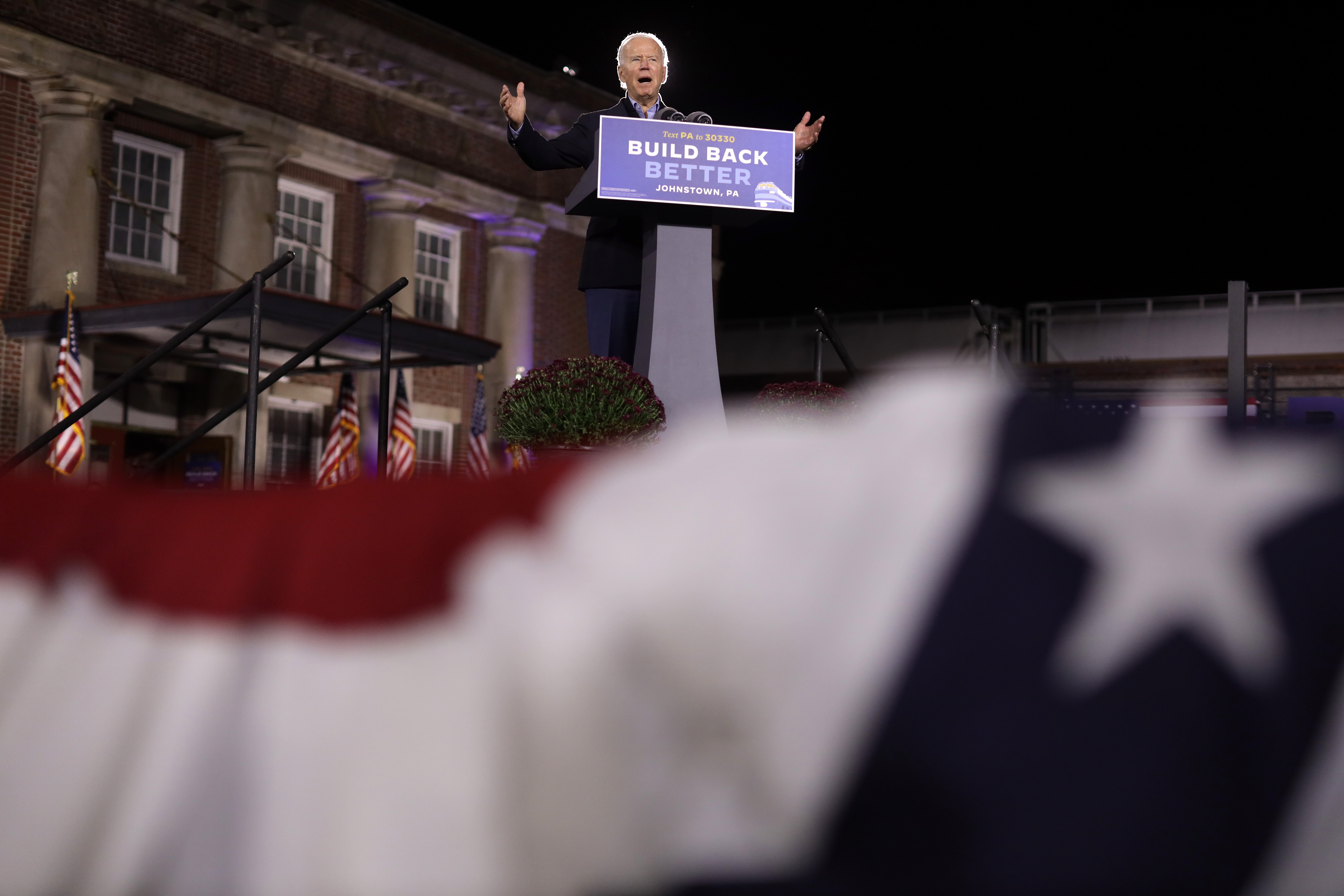What would a Biden presidency look like?
The Democratic challenger is pitching an ambitious progressive platform

A free daily email with the biggest news stories of the day – and the best features from TheWeek.com
You are now subscribed
Your newsletter sign-up was successful
The Democratic challenger is pitching an ambitious progressive platform. Here's everything you need to know:
Joe Biden says he wants to be like Franklin Roosevelt, reviving the U.S. after an economic catastrophe while also fundamentally transforming it for decades to come. Even Sen. Bernie Sanders (I-Vt.) says Biden's platform would make him "the most progressive president since FDR." Since securing the Democratic nomination, the former vice president has moved to the left on key issues, forming a "unity task force" with Sanders and adopting Sen. Elizabeth Warren's (D-Mass.) proposal of universal preschool and subsidized child care. His "Build Back Better" agenda includes more than $6 trillion in spending over a decade, which Biden insists he can negotiate with Republicans in Congress. "We're not just going to tinker around the edges," he says. Last week, we looked at President Trump's agenda for a second term; here is what Biden says he'll do if elected.
COVID-19
The Week
Escape your echo chamber. Get the facts behind the news, plus analysis from multiple perspectives.

Sign up for The Week's Free Newsletters
From our morning news briefing to a weekly Good News Newsletter, get the best of The Week delivered directly to your inbox.
From our morning news briefing to a weekly Good News Newsletter, get the best of The Week delivered directly to your inbox.
Biden has hammered the Trump administration for failing to coordinate a unified national pandemic response, and one of his first appointments would be a single official charged with addressing persistent shortages in testing supplies and personal protective equipment. Biden wants the federal government to hire 100,000 people to conduct contact tracing, and his administration would encourage asymptomatic Americans to get tested if they've come in contact with someone who has tested positive. Biden conceded last month that as president he would lack constitutional authority to impose a national mask mandate, but he would encourage mandates on the state and local level, plus new restrictions or lockdowns if necessary. Biden would push for hazard pay for essential workers, and he pledges that all Americans, insured or not, will not pay out-of-pocket expenses for an eventual COVID-19 vaccine.
The economy
Biden proposes a level of public investment in American business not seen since World War II. He wants the federal government to spend $400 billion over four years purchasing U.S.-based goods and services and $300 billion in research and development for clean-energy initiatives. Biden also calls for a $15 federal minimum wage and is aggressively pro-union. He wants the Treasury Department to offer interest-free loans to small- and medium-size businesses "through the duration" of the pandemic crisis. Moody's Analytics estimates that Biden's proposals would create 18.6 million new jobs in his first term and an average post-tax income bump of $4,800, while Trump's policies would lead to an estimated 11.2 million new jobs and a nominal income gain for the average household.
Health care
A free daily email with the biggest news stories of the day – and the best features from TheWeek.com
Biden rejected "Medicare for all" during the primaries, promising instead to strengthen and expand the Affordable Care Act, now supported by a record 62 percent of Americans. He wants to add a public option for people to buy into Medicare, allow the federal government to negotiate pharmaceutical prices, and increase federal subsidies to drive down premiums for people who purchase plans on federal exchanges. With the new subsidies, a 40-year-old making $50,000 would save $168 per month on the second-lowest-cost gold plan, the Kaiser Family Foundation found. Biden's proposal would extend coverage to millions of low-income people in the dozen states that have refused to expand Medicaid. Biden also wants to lower the age of Medicare eligibility from 65 to 60 and invest $125 billion over 10 years in drug-addiction treatment.
Taxes
Biden proposes taxing corporations and the wealthy at much higher rates. His plans would raise about $3.8 trillion over the next decade, with 75 percent of that coming from the top 1 percent of households, and more than half of that coming from the top 0.1 percent — Americans making more than $3.2 million a year. The top individual tax rate would return to 39.6 percent, capital gains accrued by millionaires would be taxed as ordinary income, and the corporate tax rate would rise from 21 percent to 28 percent. He'd also apply the 12.4 percent Social Security payroll tax to earned income above $400,000.
Education
In addition to universal pre-K for all 3- and 4-year-olds, Biden supports Sanders' College for All Act, which would provide matching federal grants to states that eliminate public college and university tuition for students from households making less than $125,000. Biden also proposes significant investment in community colleges to improve campus facilities and eliminate tuition. He wants to ban for-profit charter schools and triple federal aid — from $16 billion to about $48 billion — to low-income school districts.
Biden has proposed $2 trillion in clean-energy investments. He wants to upgrade 4 million buildings to meet energy-efficiency standards, hitting net-zero greenhouse gas emissions for all new buildings by 2030; install 500 million solar panels and 60,000 U.S.-made wind turbines to eliminate carbon emissions from the electric sector by 2035; and, most ambitiously, put the U.S. on a path to net-zero CO2 emissions by 2050. "When I think about climate change," Biden said, "the word I think of is 'jobs.'" He'd also cancel Trump's withdrawal of the U.S. from the Paris climate agreement.
Criminal justice and race
Biden has sought to make amends for his 1994 crime bill by offering sweeping, progressive criminal justice reforms. He would create a $20 billion federal grant program to incentivize states — responsible for the vast majority of the U.S. prison population — to reduce incarceration. Biden would abolish the death penalty at the federal level and allow states to legalize recreational marijuana without the threat of federal retaliation. Biden rejects calls to "defund the police," but does support calls for reforms. He wants to limit the sale of military weapons to police departments and create a federal corps of unarmed first responders — made up of social workers, EMTs, and mental-health professionals — to assist with nonviolent emergencies on the local level. Many of Biden's proposals are aimed at racial inequality, such as his plan for tuition-free public college for middle-class families. "In good times, communities of color still lag," Biden says. "In bad times, they get hit first and the hardest. And in recovery, they take the longest to bounce back."
This article was first published in the latest issue of The Week magazine. If you want to read more like it, you can try six risk-free issues of the magazine here.
-
 How the FCC’s ‘equal time’ rule works
How the FCC’s ‘equal time’ rule worksIn the Spotlight The law is at the heart of the Colbert-CBS conflict
-
 What is the endgame in the DHS shutdown?
What is the endgame in the DHS shutdown?Today’s Big Question Democrats want to rein in ICE’s immigration crackdown
-
 ‘Poor time management isn’t just an inconvenience’
‘Poor time management isn’t just an inconvenience’Instant Opinion Opinion, comment and editorials of the day
-
 The ‘mad king’: has Trump finally lost it?
The ‘mad king’: has Trump finally lost it?Talking Point Rambling speeches, wind turbine obsession, and an ‘unhinged’ letter to Norway’s prime minister have caused concern whether the rest of his term is ‘sustainable’
-
 The billionaires’ wealth tax: a catastrophe for California?
The billionaires’ wealth tax: a catastrophe for California?Talking Point Peter Thiel and Larry Page preparing to change state residency
-
 Bari Weiss’ ‘60 Minutes’ scandal is about more than one report
Bari Weiss’ ‘60 Minutes’ scandal is about more than one reportIN THE SPOTLIGHT By blocking an approved segment on a controversial prison holding US deportees in El Salvador, the editor-in-chief of CBS News has become the main story
-
 Memo signals Trump review of 233k refugees
Memo signals Trump review of 233k refugeesSpeed Read The memo also ordered all green card applications for the refugees to be halted
-
 Has Zohran Mamdani shown the Democrats how to win again?
Has Zohran Mamdani shown the Democrats how to win again?Today’s Big Question New York City mayoral election touted as victory for left-wing populists but moderate centrist wins elsewhere present more complex path for Democratic Party
-
 Millions turn out for anti-Trump ‘No Kings’ rallies
Millions turn out for anti-Trump ‘No Kings’ ralliesSpeed Read An estimated 7 million people participated, 2 million more than at the first ‘No Kings’ protest in June
-
 Democrats: Harris and Biden’s blame game
Democrats: Harris and Biden’s blame gameFeature Kamala Harris’ new memoir reveals frustrations over Biden’s reelection bid and her time as vice president
-
 ‘We must empower young athletes with the knowledge to stay safe’
‘We must empower young athletes with the knowledge to stay safe’Instant Opinion Opinion, comment and editorials of the day